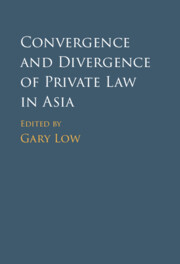Book contents
- Convergence and Divergence of Private Law in Asia
- Convergence and Divergence of Private Law in Asia
- Copyright page
- Dedication
- Contents
- Tables
- Contributors
- Acknowledgments
- Abbreviations
- 1 Introduction
- 2 Uniform Law and the Production and Circulation of Legal Models
- 3 Convergence, Divergence and Diversity in Financial Law: The Experience of the UNCITRAL Model Law and Cross-Border Insolvency
- 4 The New York Convention and the UNCITRAL Model Law on International Commercial Arbitration: Existing Models for Legal Convergence in Asia?
- 5 Convergences and Divergences: Comparing Contractual and Organizational Models in International Regulatory Cooperation
- 6 Law as a Market Standard: Voluntary Unification in Contract and Company Law
- 7 Is the Harmonisation of Asian Contract Law Possible? The Example of the European Union
- 8 The Presumption of Regularity in Chinese Corporate Contracting: Evidence and the Prospect of Regional Convergence
- 9 Mind the Gap: Studying the Implementation Discrepancy for the ASEAN Economic Community
- 10 The Rule of Law as Key to the ASEAN Legal Order: How Can It Be Ensured?
- 11 How Asian Should Asian Law Be?
- Index
8 - The Presumption of Regularity in Chinese Corporate Contracting: Evidence and the Prospect of Regional Convergence
Published online by Cambridge University Press: 17 February 2022
- Convergence and Divergence of Private Law in Asia
- Convergence and Divergence of Private Law in Asia
- Copyright page
- Dedication
- Contents
- Tables
- Contributors
- Acknowledgments
- Abbreviations
- 1 Introduction
- 2 Uniform Law and the Production and Circulation of Legal Models
- 3 Convergence, Divergence and Diversity in Financial Law: The Experience of the UNCITRAL Model Law and Cross-Border Insolvency
- 4 The New York Convention and the UNCITRAL Model Law on International Commercial Arbitration: Existing Models for Legal Convergence in Asia?
- 5 Convergences and Divergences: Comparing Contractual and Organizational Models in International Regulatory Cooperation
- 6 Law as a Market Standard: Voluntary Unification in Contract and Company Law
- 7 Is the Harmonisation of Asian Contract Law Possible? The Example of the European Union
- 8 The Presumption of Regularity in Chinese Corporate Contracting: Evidence and the Prospect of Regional Convergence
- 9 Mind the Gap: Studying the Implementation Discrepancy for the ASEAN Economic Community
- 10 The Rule of Law as Key to the ASEAN Legal Order: How Can It Be Ensured?
- 11 How Asian Should Asian Law Be?
- Index
Summary
When entering into transactions, a company acts through individuals. A transaction purportedly made in the name or on behalf of the company, however, may not be duly authorized. An issue that courts often confront is therefore the enforceability of corporate contracts not duly authorised. A decision on this issue allocates the risks for corporate transactions to either the company or the person seeking to deal with it. This issue is resolved at the common law, as well as statutorily using the “indoor management rule”, which is a ‘presumption of regularity’, supplemented by the doctrines of actual and apparent authority. In the People’s Republic of China, the courts are less well equipped. The PRC legal framework does not provide for a presumption of regularity. PRC Company Law art. 16, which has been enacted to regulate corporate transactions that gives a security, is silent on third-party rights and precludes the operation of the rules on apparent authority. This chapter explores the possibility of completing a nascent presumption of regularity evidenced in the PRC courts adjudication of art. 16 cases, using the common law IMR as a model.
Keywords
- Type
- Chapter
- Information
- Convergence and Divergence of Private Law in Asia , pp. 153 - 179Publisher: Cambridge University PressPrint publication year: 2022



